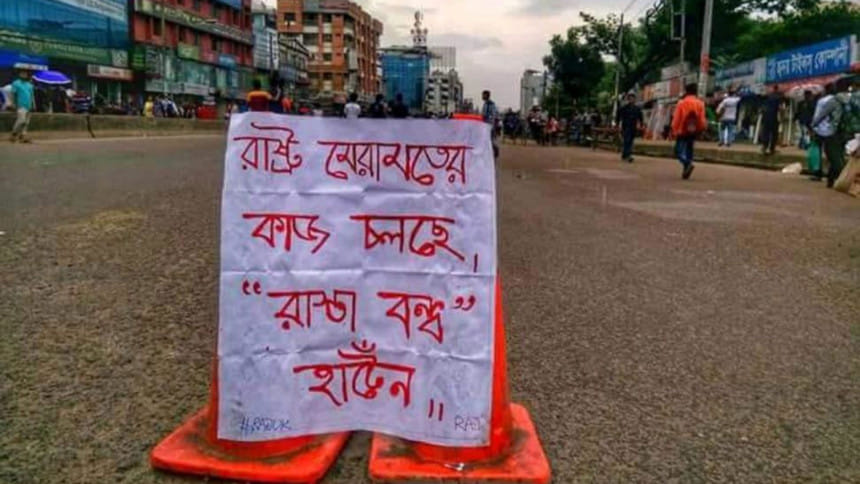Passing new laws is not enough for road safety

Two years after the countrywide road safety movement, many of us feel a sense of frustration and disappointment as the much-expected changes are yet to occur. However, Shahidul Islam Apon, an activist of that movement, believes that changes are bound to happen. Speaking at a Star Forum webinar held on August 22, Apon reiterated his conviction that the movement for safe roads is not over yet—it has been going on and will continue until safe roads are ensured for all.
Apon and some other participants of the road safety movement went on to form Nirapod Sarak Andolon—an organisation that has been working relentlessly to make our roads safe. They have been campaigning about road safety in schools and colleges and trying to help the families of road crash victims. They have also been trying to identify the systemic flaws and corruption that have led to this anarchy in our transport sector.
So many lives are being lost on our roads every day, but the reasons for the accidents are not being investigated with due importance. While unfit vehicles, unskilled drivers and unhealthy competition among the drivers are the most commonly identified reasons for road accidents, the issues of faulty road designs and lack of capacity of the regulatory authorities are often neglected.
Thousands of students took to the streets demanding safe roads and seeking justice for the killing of two students of Shaheed Ramiz Uddin Cantonment College on July 29, 2018. A mad race between two buses claimed these two innocent lives.
However, deaths from road accidents have continued unabated. As recently as August 23, six people died in a road crash in Mymensingh's Bhaluka on the Dhaka-Mymensingh highway as their car was hit by a speeding bus. The question that comes to mind after seeing the picture of the spot where the accident happened is, were there any speed breakers on the road (there was an educational institution across the road) which could have prevented the crash?
On August 7, a mountaineer was killed in a road crash in the capital as a microbus hit her bicycle on Lake Road, adjacent to Chandrima Udyan in the capital. Had there been a separate cycle lane on the road, the heart-breaking accident could have been avoided.
These examples might give us some idea on the reasons behind road crashes, in which a staggering number of people lose their lives or get maimed every day.
Although the government passed the much-awaited Road Transport Act 2018 after the student movement for road safety, they could not enforce it due to protests from the transport owners and workers. When the government finally took the initiative to enforce the law in November last year, transport associations called strikes, demanding amendments to some sections of the law. As the government gave in to their demands, the law is now being enforced only partially, keeping some of the provisions ineffective.
The prime minister's 17-point directives and the observation of several police weeks also did little to ensure road safety. According to police data, 4,138 people were killed in 4,147 road accidents in 2019 while 2,635 lives were lost in 2,609 road crashes in 2018. Different private organisations, however, recorded a much higher number of deaths during the same time.
Now the question is, can our roads be made safe and the transport sector disciplined only by enforcing the law and other government directives? Or should we also look at other underlying factors that are hugely contributing to road accidents? Also, are only the transport workers responsible for these deaths? What are the owners' responsibilities in ensuring safe roads?
The absence of by-lanes or separate lanes for slow moving vehicles is a major reason for road accidents on our highways. If Nasiman, Kariman and Bhotbhoti (local passenger vehicles) continue to run on the highways, how can we reduce accidents there?
Moreover, according to research, there are 222 black spots on our highways where the majority of accidents take place. These points of the roads need to be redesigned to reduce road accidents.
According to Osman Ali, General Secretary, Bangladesh Road Transport Workers' Federation, only Tk 200 to 500 crore is required to perform these redesigning. So, what is stopping the government from correcting these faulty road designs? Blaming the drivers for accidents without correcting these black spots is in no way acceptable.
At the Star Forum discussion, Osman Ali said, "if you make a law only to punish the drivers but do not protect their interests, why will the transport workers accept the law?"
Besides, providing training to the 70 lakh drivers and transport workers should be a priority for the government. Although the Bangladesh Road Transport Authority (BRTA) has 23 training institutes, only 14 of them are currently operating. And only one institute in Gazipur has been providing some sort of training to transport workers. BRTA must make all the training institutes operational and ensure that drivers and transport workers get proper training before they are given driving licenses and jobs in the sector.
Clearly, on top of enforcing the law, there is a lot more that needs to be done. We need urgent institutional reforms to discipline this sector, thereby making the roads safe for all. Without ensuring good governance, accountability and proper planning, no change will come.
BRTA does not have the capacity or manpower to perform its mandated duties. The regulatory body must build its capacity to perform its job efficiently, and it needs the government's support to do so.
As Professor Shamsul Hoque, transport expert and former director of the Accident Research Institute at BUET, believes: "For a healthy transport system, we need to develop the 3E system—engineering and planning, education, and enforcement. We need to first focus on engineering and planning, then we should educate people and spread awareness, and at the third stage, there will be enforcement of the law. This system has been followed in the developed world and we should do it too."
Professor Hoque also emphasised on bus routes rationalisation and introduction of a bus franchise system in Dhaka to bring discipline to the public transport system.
Besides, if drivers are paid a monthly salary and contractual driving can be stopped, this would definitely stop reckless driving as buses won't race against one another to maximise their profit.
Coming back to the issues regarding the Road Transport Act, we hope there is still time to properly evaluate the law and bring the necessary amendments to it. The law should be such that it ensures everyone's safety and protection. While the legitimate concerns of the transport workers should be taken into consideration, the law should not also forget the concerns of the common people who are routinely falling victims to horrific road crashes.
While there was scope in the Motor Vehicles Ordinance 1983 for the road accident victims to get compensation, in the new law, this specific provision has been scrapped. Instead, a provision for creating a financial assistance fund for the victims has been kept in the RTA 2018.
According to Sara Hossain, Honourary Executive Director, Bangladesh Legal Aid and Services Trust, there should be scope in the new law for the victims to seek compensation. For that, amendment is necessary.
And as filmmaker Catherine Masud puts it, getting compensation is a right of the victims and their families, it is not charity. Besides, through filing compensation cases, we can hold the owners of the vehicles as well as the insurance companies accountable because while the owners are employing the drivers without following due procedure, the insurance companies are also not following the rules in giving compensation.
Finally, we must include the issue of road safety in the school curriculum. If we can teach our children about the basics of road safety from early childhood, they will never forget the lessons in their lifetime.
Naznin Tithi is a member of the editorial team of The Daily Star.

 For all latest news, follow The Daily Star's Google News channel.
For all latest news, follow The Daily Star's Google News channel. 



Comments